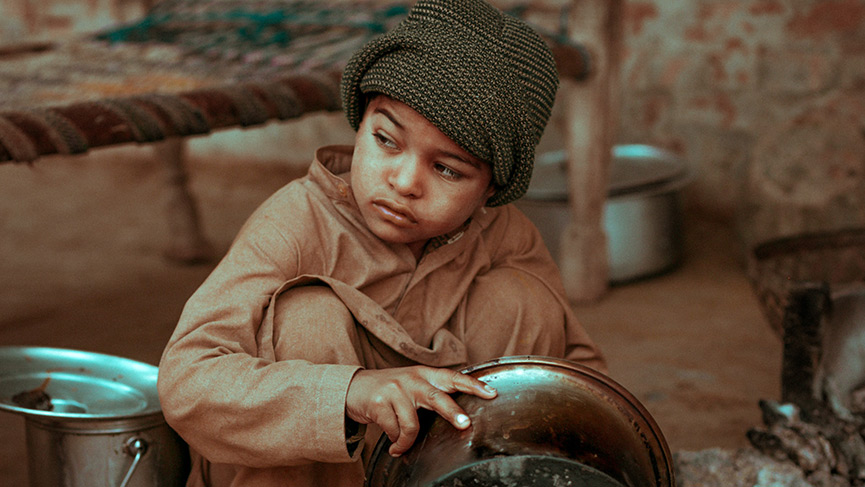Christmas for Christians in the Middle East

International
People living in peaceful countries rejoice as Christmas approaches, but how do Christians living in the Middle East feel at this time of the year? Carl Hétu, director of the Catholic Near East Welfare Association known as CNEWA, explains.
CNEWA is a Catholic association that supports the poor and weakened churches in the Near East. Founded in 1926 by Pope Pius XI, this association shares the love of Christ with Near East Christians and churches. Active in Canada since 2005, CNEWA’s mission continues to be led by Pope Francis.
“Our mission is to make sure that a Christian church stands in the country and is able to maintain the mission, which is to evangelize and serve.” CNEWA is therefore present in different countries and adapts itself to the political, religious, financial and social context within. In India, for instance, we have 10 people working with churches and religious communities, to understand their specific needs and the needs of the poor, and afterward our offices in New York and in Ontario create programs specifically for India.”
Humanitarian Assistance and Pastoral Aid
CNEWA works in different areas, pastoral aid being the first. It helps in supporting priests, religious communities and lay people in their ministry within the Church, and in catechizing young people and families. This counts for about 35% of the work done by the association.
Humanitarian and social assistance is the other area. CNEWA helps in supporting various services such as healthcare, and help to the elderly, orphans and pregnant women. Christian churches and local Christian communities offer those services. They are also quite involved in the education system. Most students attending primary schools and high schools in the Near East are Muslims (in Palestine, Iraq, Iran, Syria): “This maintains an ongoing dialogue, so that people can live together and recognize everyone’s values,” insists Carl Hétu. The best example is probably what is being done in Israel. They are Israelites, but non-Jews. Most of them are Arabic, but non-Muslims. Maison du Sacré-Cœur in Haifa thus offers care to everyone without exception.
Finally, CNEWA brings emergency assistance to displaced people. Various waves of violence in the Middle East force the local Church to adapt its services to the problems raised. Iraqi and Lebanese conflicts, intifadas and waves of refugees are events religious communities must face. “Things were different before 2011, the year in which the Syrian war began: refugees require help as much as those who welcome them. In Lebanon, distribution centres for the poor are now managed by the Lebanese people … with Syrian refugees,” explains Carl Hétu.
A Christmas Under Surveillance
At the approach of Christmas, the communities are getting organized in order for the poorest to celebrate joyfully. CNEWA held an important fundraising campaign so that Near East Christians could have a special programming. “These Christians deeply await the arrival of Christmas: they need to celebrate their hope in God who accompanies them,” explains Carl Hétu. Faith is indeed very important to them: this is what keeps them from sinking. “They suffered like God suffered, so they believe something good will happen to them one day,” says Carl Hétu. Despite the difficulties, Christians of the Near East pin their hopes on the possibility of a new and better start.
In many countries like Syria, Iraq or Egypt, Christians remain wary despite the lulls and will remain pretty discreet on Christmas Day. They will attend Mass under the protection of armed people. In Egypt, security will be provided by the army, but in other countries churches themselves have to see to the safety of the faithful, protecting them from fanatics who could “strike solidly” on that day, explains Hétu.
In Lebanon, Israel and elsewhere, things have been fairly quiet. In Beirut, the dispensary will distribute gifts and a great familial Christmas Mass will celebrate Christ’s Birth.
In Canada, Christians of the Near East – almost three quarters of whom are refugees who arrived about five or six years ago – particularly rely on praying with their brothers who have not left their country on Christmas Day.
Whether it is celebrated openly or not, Christmas remains nevertheless a celebration filled with joy and hope for everyone.
------------------------------------------
With your help, CNEWA can support Churches of the Near East, confirm human dignity, ease poverty and give hope. If you wish to make a donation, go to: http://faitesundon.cnewa.ca/ or call 1 866 322-4441.

Comment
Comment
Add new comment